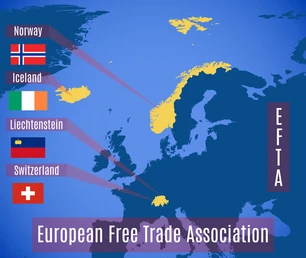Important Facts For Prelims
Data Exclusivity in Trade Talks with EFTA
- 20 Feb 2024
- 4 min read
Why in News?
India has recently taken a firm stance against the inclusion of 'data exclusivity' clauses in its ongoing discussions with the European Free Trade Association (EFTA) for a free trade agreement.
What is Data Exclusivity under the Trade Agreement?
- About: Data exclusivity pertains to a clause in this draft agreement that puts a minimum 6-year embargo (a legal prohibition on commerce) on clinical trial data generated during the testing and development of a drug.
- Thus, manufacturers seeking to produce generic versions of drugs would either need to generate such data on their own, which is an expensive proposition, or wait out for the above specified period before selling their versions in India.
- Impact on India's Generic Drug Industry: India's generic drug industry has been pivotal in providing affordable alternatives to expensive medications globally.
- However, the imposition of data exclusivity could severely hamper this industry's growth and accessibility of affordable medicines.
- Historical Context and Rejection: Demand for data exclusivity has consistently emerged since 2008 from both the European Union (EU) and the EFTA during trade negotiations with India.
- Despite this, India has consistently refused these requests.
What is the European Free Trade Association?
- About: The EFTA is the intergovernmental organisation of Iceland, Liechtenstein, Norway and Switzerland (all four are not a part of the EU).
- It was founded by the Stockholm Convention in 1960.
- It aims to promote free trade and economic integration to the benefit of its four Member States and their trading partners around the globe.
- India and EFTA: The total value of commercial trade between the EFTA members and India exceeded USD 6.1 billion in 2022.
- The biggest exports to India were pharmaceutical items (11.4%) and machinery (17.5%), while organic chemicals (27.5%) made up the majority of EFTA imports.
What is a Free Trade Agreement?
- About: A free trade agreement (FTA) is a pact between two or more nations to reduce barriers to imports and exports among them.
- Under this agreement, goods and services can be bought and sold across international borders with little or no government tariffs, quotas, or prohibitions to inhibit their exchange.
- It is the opposite of trade protectionism or economic isolationism.
- Historical Context: It was first popularised in 1817 by economist David Ricardo in his book, "On the Principles of Political Economy and Taxation."
- He argued that free trade expands diversity and lowers the prices of goods available in a nation while better exploiting its homegrown resources, knowledge, and specialised skills.
- FTA’s of India: So far, India has signed 13 Free Trade Agreements (FTAs) with its trading partners including the Agreement on the South Asian Free Trade Area (SAFTA), India-Singapore Comprehensive Economic Cooperation Agreement (CECA), India-Japan CEPA, and India-Australia Economic Cooperation and Trade Agreement (ECTA).
UPSC Civil Services Examination, Previous Year Questions (PYQs)
Prelims
Q. Consider the following countries: (2018)
- Australia
- Canada
- China
- India
- Japan
- USA
Which of the above are among the ‘free-trade partners’ of ASEAN?
(a) 1, 2, 4 and 5
(b) 3, 4, 5 and 6
(c) 1, 3, 4 and 5
(d) 2, 3, 4 and 6
Ans: (c)
Q. A “closed economy” is an economy in which (2011)
(a) the money supply is fully controlled
(b) deficit financing takes place
(c) only exports take place
(d) neither exports or imports take place
Ans: (d)







